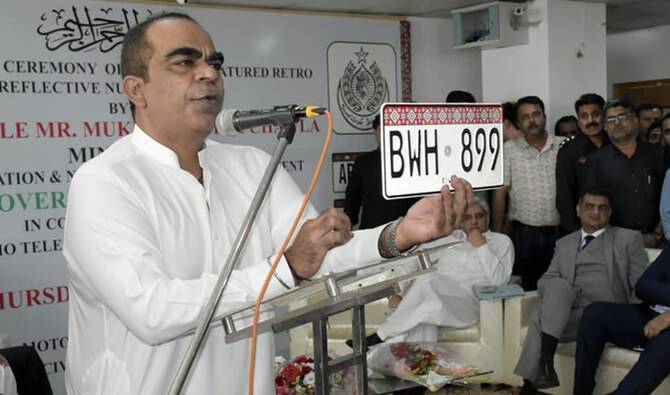Sindh bans vehicles without Ajrak-inscribed registration plates

Stay tuned with 24 News HD Android App

The Sindh government has banned vehicles without the ancient Ajrak-inscribed registration plates from plying the roads from April 3.
The announcement was made by the Sindh excise department on Saturday.
Ajrak, a vibrant block-printed cotton cloth with striking crimson and indigo hues, is deeply ingrained in the Sindhi culture. Adorned with symmetrical patterns and sparkling white motifs, primarily stars, it is believed to have roots in the ancient Indus Valley Civilization.
The cherished fabric accompanies every stage of life in Sindh, from infant cradles to grand ceremonial occasions. Its versatility is reflected in its wide array of uses as a hammock for infants, bridal accessory, turban, shawl, bed cover, tablecloth, meaningful gift, and as a token of respect for honored guests.
The Sindh government had decided to replace the old, yellow-colored registration plates with white, Ajrak-inscribed plates in July 2021, keeping the province’s traditions in view. While some motorists adopted the new plates, owners of more than 3 million vehicles continue to use the old ones, according to the excise department.
“This will not only allow vehicles from Sindh to represent their province wherever they travel, but also showcase the region’s 6,000-year-old history of peace and civilization,” Arab News quoted Shabbir bin Babar, a spokesperson for the Sindh excise department, as saying.
In December last year, the excise and taxation department had made it mandatory for all private and commercial vehicles to obtain the new plates.
The significance of Ajrak in Sindh’s culture can also be gauged from a bust of the Priest-King excavated at Mohenjo-daro, a UNESCO world heritage site and the largest settlement of the ancient Indus Valley Civilization that flourished around 2,500 BCE, that is currently housed in the National Museum of Pakistan in Karachi, depicting his one shoulder draped in a cloth resembling Ajrak.
Sindh Excise, Taxation and Narcotics Control Minister Mukesh Kumar Chawla told Arab News the initiative is aimed at celebrating the region’s rich culture.
“No weapons have ever been found among the artifacts unearthed at Mohenjo-daro, which sets it apart from other ancient discoveries worldwide,” he said.
“But we have the discovery of beautiful Ajrak, which signifies that the inhabitants of Sindh were always a peace-loving and civilized people.”
Chawla said Ajrak is an integral part of Sindh’s rich culture that reflects the region’s hospitality.
“The people of Sindh are considered some of the most hospitable globally,” he said. “[Ajrak is] a reflection of these traditions and their deep connection with the land.”
